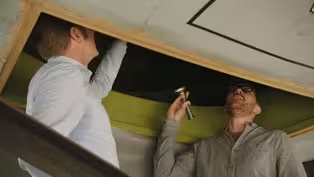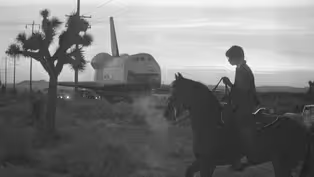
Astronaut Danny Olivas and the Legacy of Space Shuttle Endeavor
Clip: Season 7 Episode 1 | 6m 3sVideo has Closed Captions
Nathan meets with astronaut Danny Olivas at Griffith Observatory.
Nathan interviews astronaut Danny Olivas at Griffith Observatory. They discuss the legacy of the Space Shuttle Endeavour and its significance for space exploration, as well as its impact on those who worked on it from the ground. The scale of the Space Shuttle program required a diverse workforce, and its many missions featured a more diverse group of astronauts than had been seen previously.
Problems playing video? | Closed Captioning Feedback
Problems playing video? | Closed Captioning Feedback
Lost LA is a local public television program presented by PBS SoCal

Astronaut Danny Olivas and the Legacy of Space Shuttle Endeavor
Clip: Season 7 Episode 1 | 6m 3sVideo has Closed Captions
Nathan interviews astronaut Danny Olivas at Griffith Observatory. They discuss the legacy of the Space Shuttle Endeavour and its significance for space exploration, as well as its impact on those who worked on it from the ground. The scale of the Space Shuttle program required a diverse workforce, and its many missions featured a more diverse group of astronauts than had been seen previously.
Problems playing video? | Closed Captioning Feedback
How to Watch Lost LA
Lost LA is available to stream on pbs.org and the free PBS App, available on iPhone, Apple TV, Android TV, Android smartphones, Amazon Fire TV, Amazon Fire Tablet, Roku, Samsung Smart TV, and Vizio.
Providing Support for PBS.org
Learn Moreabout PBS online sponsorshipYou know, the borders that I noticed from space were those between the water and the land, and there's really nothing else.
Masters: So you grew up for a few years in Los Angeles.
You're born in Los Angeles, and then you moved to El Paso, but now you moved back to L.A. Southern California has a lot of claims to fame.
I wonder how many Southern Californians are aware that space travel is one of them.
Olivas: You know, when NASA was looking at where to place the Space Shuttle orbiters when the Space Shuttle retired, it was natural for Space Shuttle Endeavor to actually make her way home where she was born.
Being able to bring her back home and get people to fully appreciate what can be done out here and the creativity, the ingenuity, the kind of forward looking way that I feel is the vibe here in L.A. Man: The Shuttle's gonna be coming down Crenshaw right here.
This is one of the historical boulevards in our neighborhood, and it's gonna be a beautiful, historical site.
[Indistinct chatter] Masters: I try to look at it as a monument to the huge labor force that went into creating the Space Shuttle, right?
We're talking about tens of thousands of not just engineers, but skilled tradesmen.
It's a huge contribution.
Olivas: Well, and in fact, it's in that contribution that I found my inspiration to become an astronaut.
I was born in the Valley.
At the time, my dad was a machinist, and he worked for, you know, a subcontractor of a subcontractor, so pretty far deep in the whole subcontracting pool, but there was a machine shop, and he built parts, and I remember ultimately when we moved to El Paso, we took a family vacation to Houston, and we were going through the museum, and I remember, of course, me being a child of the Apollo era, I was inspired by what I was seeing because I loved looking through my $15 telescope at home in West Texas, El Paso, at the sky and at the moon and just thinking to myself, "Space is cool."
And then knowing that human beings went there even cooler.
So we're walking out of the museums, and we're getting ready to leave, and my father calls us over, me and my sister and my brother and says, "Hey, I want to show you something," and so he's standing in front of a mockup, and he begins to start to explain to us some of the parts that he made when he worked for this company Gamma Precision Products.
I remember thinking to myself, "Wow!
My dad is part of what made that happen," and it was a great sense of pride, but then as I looked at this rocket engine, I saw all these other parts and pieces that weren't from my dad.
They were from other dads and moms and, you know, aunts and uncles and brothers and sisters, right?
I think for me that was my inspiration, that that's what I wanted to be, not necessarily to build a part but to be part of something that the accomplishments were a collection of what everybody could contribute and pull together.
So space is not about one person, not about a person who wears a blue flight suit, but what everybody does to actually make it happen.
Masters: My grandfather worked at North American Rockwell in Downey and specialized in something called micro connections.
I still don't really know exactly what that is, but he worked on the mockup, and so the Shuttle was always a special thing in our family, and when he got to see Endeavor come to Los Angeles, you know, it was a really special moment for him, so when I look at Endeavor, as I'm sure you do, I see a lot more than just a space vehicle.
It's really a monument to our region, your father, my grandfather.
There were tens of thousands of people like them who contributed to this.
It's a big collective effort.
Olivas: And human space flight, as I see it, as much as it is about exploring the universe and the natural world around us, the human spirit, the human capability for ingenuity and creativity and innovation and skill.
Masters: I've been thinking a lot about how we should think about the Space Shuttle's legacy, what its place in the broader narrative of space travel will be.
Olivas: I personally think that the Space Shuttle program's legacy is actually one that has nothing to do with science.
It has to do with society, and that is that the Space Shuttle program ushered in a level of diversity that our country had never seen before, where in this one area of space we have found a way to work together.
The Space Shuttle program saw its first female astronaut.
We saw its first African-American male, African-American male commander, female African-American, you know, Hispanic American.
You know, all these different groups that represent America now had an opportunity to showcase that there was a place for them in this grand experiment, you know, called space exploration.
Masters: For somebody who's not an astronaut or an engineer, I mean, how can they contribute to the future of space travel?
Olivas: So one of, I think, the greatest things about space that people don't know is how much space there is in space for everyone, but the fact of the matter is that every aspect of life touches space, so whether you're talking about a journalist who's interviewing people about space, whether you're talking about lawyers who are developing contracts, business development groups who are trying to nurture brand-new small businesses, or artists or educators, there is a lot of space for people who are enthusiastic and passionate about space to bring their skillset and to help contribute that basic human desire to explore the cosmos.
Man: 3, 2, 1.
We have ignition.
We have ignition of the solid rocket boosters and liftoff.
Liftoff of America's Space Shuttle.
Different man: I'm proud.
Just like Apollo.
I'm proud to be part of it.
Different man: We are so privileged to work on this program.
Different man: Best flying machine there is.
Different man: Best flying machine.
Different man: Makes us proud to just be a part of the team and know that we're the few in the country that can do this kind of a job.
Different man: That's true.
Woman: I think it's very exciting to be involved with a company that is doing something like this.
Man: I feel very privileged.
You know, everybody doesn't have a chance to work on the Shuttle.
Different man: A lot of my friends, when my wife or I will tell them that I work on the Space Shuttle, they seem to be pretty impressed, and it makes me feel good.
I'm pretty impressed with the job, too.
In Downey, A Space Shuttle Hides in Plain Sight
Video has Closed Captions
Clip: S7 Ep1 | 3m 48s | A space shuttle mock-up sits in a maintanance yard in The City of Downey, awaiting its moment. (3m 48s)
Preview: S7 Ep1 | 30s | The Space Shuttle Endeavour’s journey is traced from its origins. (30s)
Providing Support for PBS.org
Learn Moreabout PBS online sponsorshipSupport for PBS provided by:
Lost LA is a local public television program presented by PBS SoCal

















